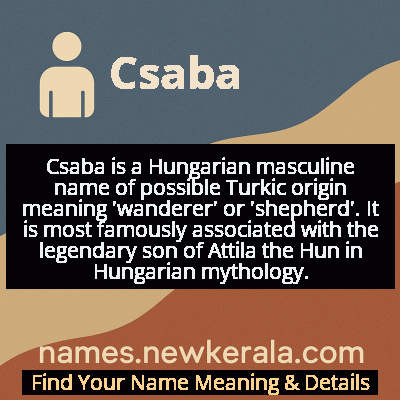Csaba Name Meaning & Details
Origin, Popularity, Numerology Analysis & Name Meaning of Csaba
Discover the origin, meaning, and cultural significance of the name CSABA. Delve into its historical roots and explore the lasting impact it has had on communities and traditions.
Name
Csaba
Gender
Male
Origin
Hungarian
Lucky Number
8
Meaning of the Name - Csaba
Csaba is a Hungarian masculine name of possible Turkic origin meaning 'wanderer' or 'shepherd'. It is most famously associated with the legendary son of Attila the Hun in Hungarian mythology.
Csaba - Complete Numerology Analysis
Your Numerology Number
Based on Pythagorean Numerology System
Ruling Planet
Saturn
Positive Nature
Ambitious, efficient, realistic, and authoritative.
Negative Traits
Materialistic, stressed, confrontational, and can be overly ambitious.
Lucky Colours
Dark blue, black.
Lucky Days
Saturday.
Lucky Stones
Blue sapphire, amethyst.
Harmony Numbers
2, 4, 6.
Best Suited Professions
Business leaders, managers, financial services, law enforcement.
What People Like About You
Leadership, determination, organizational skills.
Famous People Named Csaba
Csaba Horváth
Chemical Engineer
Pioneer in high-performance liquid chromatography (HPLC) techniques
Csaba Kesjár
Race Car Driver
Hungarian racing champion who competed in European Formula 3 championships
Csaba Szekely
Screenwriter
Award-winning Hungarian-Canadian screenwriter known for 'The Borgias' and 'Moscow' series
Csaba Csordás
Footballer
Hungarian professional footballer who played for Ferencvárosi TC and the national team
Name Variations & International Equivalents
Click on blue names to explore their detailed meanings. Gray names with will be available soon.
Cultural & Historical Significance
The name Csaba represents a crucial link in the Hungarian origin myth that connects the Magyars to their supposed Hunnic ancestors. This connection was politically significant during the medieval period when Hungarian rulers sought to establish prestigious genealogies. The legend of Csaba's celestial return provided comfort during times of invasion and national threat, reinforcing the idea that Hungarians were never truly alone in their struggles. This cultural narrative helped shape Hungarian national identity and resilience throughout centuries of challenge and change.
Extended Personality Analysis
Individuals named Csaba are often perceived as strong-willed, independent, and possessing natural leadership qualities, reflecting the name's legendary warrior associations. They tend to be adventurous and resilient, with a deep sense of loyalty to family and community. Many Csabas exhibit a blend of practicality and visionary thinking, able to navigate both immediate challenges and long-term goals. Their personality often includes a protective nature toward those they care about, combined with a certain wanderlust or desire for exploration.
In social settings, Csabas typically project confidence and reliability, making them natural problem-solvers and mediators. They often demonstrate a strong connection to tradition and heritage while being forward-thinking in their approach to modern challenges. The name carries expectations of courage and determination, and many who bear it develop a sense of responsibility to live up to these qualities. While they can be fiercely independent, Csabas usually maintain strong family bonds and community connections, balancing their adventurous spirit with deep roots in their cultural identity.
Modern Usage & Popularity
Csaba remains a distinctly Hungarian name that maintains steady, though not overwhelming, popularity in Hungary and among Hungarian diaspora communities. While it peaked in usage during the 20th century, particularly in the 1960s-1980s, it continues to be chosen by parents seeking a name with strong national and historical resonance. The name is uncommon outside Hungarian-speaking regions, which preserves its cultural specificity. In contemporary Hungary, Csaba is recognized as a traditional yet still relevant masculine name, often selected by families with an interest in Hungarian history and mythology or those wanting to honor ancestral connections. Its usage has declined somewhat in recent decades as more international names gain popularity, but it maintains a stable presence as a culturally significant choice that evokes national pride and historical continuity.
Symbolic & Spiritual Meanings
Symbolically, Csaba represents the eternal guardian and the promise of salvation in Hungarian cultural consciousness. The name embodies the concept of the 'wandering hero' who remains connected to his people across time and space. Csaba symbolizes the bridge between past and present, between earthly struggles and celestial assistance. The mythological 'Csaba's Road' (the Milky Way) represents the eternal pathway along which help may arrive when most needed, making the name a symbol of hope, protection, and national continuity. It also carries connotations of leadership born of heritage and the responsibility that comes with legendary ancestry, serving as a reminder that strength often comes from understanding one's roots while looking toward the future.

